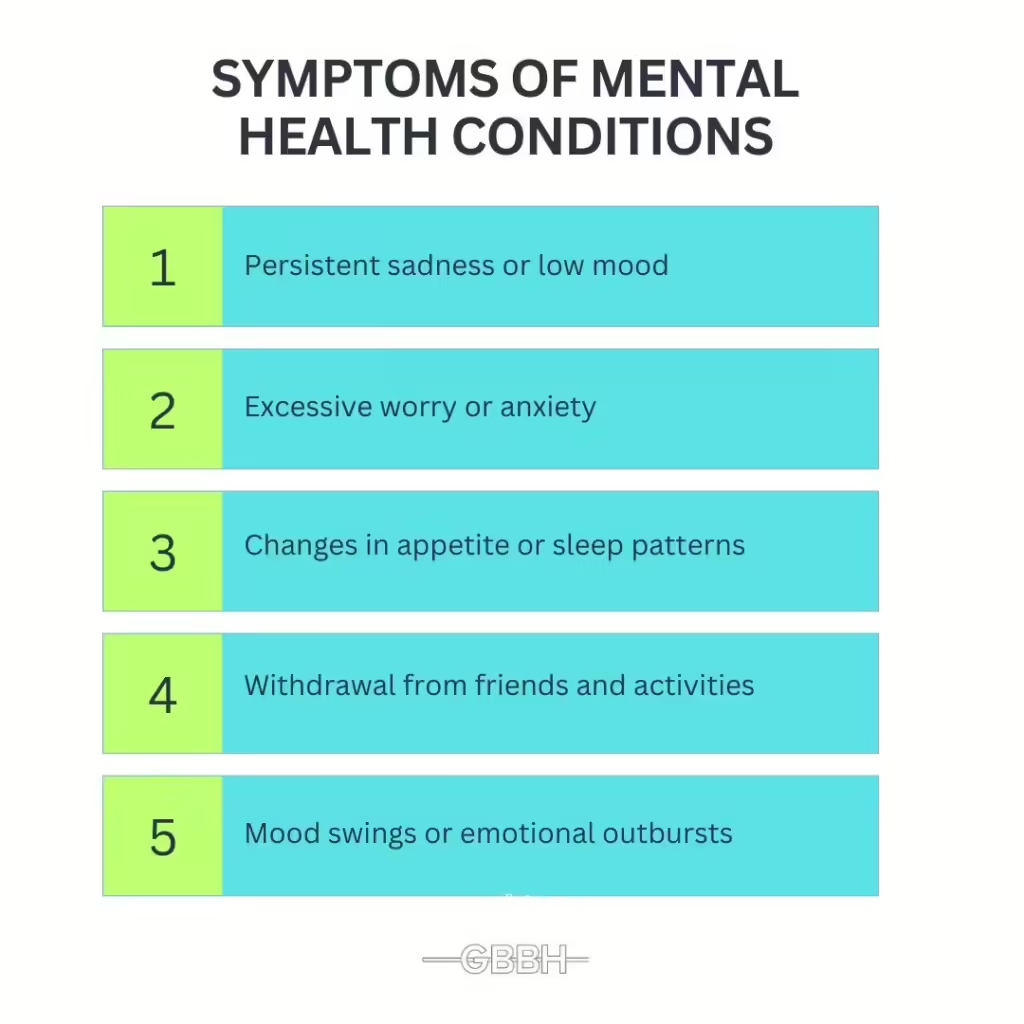Mental health is an essential part of human health that takes into account the emotional, and cognitive states of the people. Sadly, mental health issues are either ignored or not well understood, even if they are very common. Learning about different classification of mental disorders increases awareness to the society and promotes efforts towards a proper treatment plan. Anyone considering Mental Health Programs or a Mental Health Treatment Center in Massachusetts will find this article helpful in gaining an understanding of common mental health disorders and treatment options.
Different Types of Mental Health Illness
1. Depression
It is not simply just being ‘down in the dumps’ or ‘feeling blue’; it is, more or less, the state of being desperately fed up with life and unable to derive pleasure in things that, hitherto, seemed pleasurable. A depressed man or woman takes time to get out of bed, loses pleasure and joy in things that used to interest him or her, and may also wake up with headaches or tummy aches.
2. Anxiety Disorders
Anxiety disorders are characterized mainly by factors such as worry, fear and nervousness. These include generalized anxiety disorder (GAD), panic and social phobia among others. Unlike normal people who sometime develop anxiety, people with anxiety disorders tend to experience anxiety in a severe way even where there is no dangerous situation.
Anxiety disorders are among the most prevalent mental health conditions. They encompass a range of disorders, including:
- Generalized Anxiety Disorder (GAD): Characterized by excessive worry about various aspects of life, such as health, work, or social interactions.
- Panic Disorder: Involves recurrent panic attacks—sudden periods of intense fear or discomfort, often accompanied by physical symptoms like heart palpitations and shortness of breath.
- Social Anxiety Disorder: Marked by intense fear of social situations, leading to avoidance of interactions and significant distress.
Anxiety disorders can significantly interfere with daily life, but they are treatable through therapy, medication, or a combination of both.
3. Bipolar Disorder
Bipolar disorder results in swinging moods between the highest of peaks and the lowest of valleys; Mania and depression. People experiences manic symptoms can be elated, hyperactive, and full of themselves during the period of mania and can be listless and hopeless during the period of depression. Antipsychotics and mood stabilizers are the common medicines prescribed for bipolar disorder and clients are often advised to undergo therapy as well.
4. Post-Traumatic Stress Disorder (PTSD)
PTSD can develop after someone has experienced or witnessed a traumatic event. Common among survivors of war, accidents, or abuse, PTSD is marked by flashbacks, nightmares, and severe anxiety. It can make people feel constantly on edge or lead them to avoid situations that remind them of the trauma.
5. Mood Disorders
Mood disorders primarily affect a person’s emotional state. The two most common types include:
- Depression: Characterized by persistent feelings of sadness, hopelessness, and a lack of interest in activities once enjoyed. It can lead to physical symptoms such as fatigue and changes in sleep or appetite.
- Bipolar Disorder: Involves alternating episodes of depression and mania (an excessively elevated mood), which can lead to risky behavior and significant disruptions in daily life.
Mood disorders require careful diagnosis and treatment, often involving psychotherapy and medication to stabilize mood and manage symptoms.
6. Psychotic Disorders
Psychotic disorders involve a disconnection from reality. The most well-known of these is Schizophrenia, characterized by symptoms such as hallucinations (hearing or seeing things that aren’t there), delusions (false beliefs), and disorganized thinking. Early intervention and a comprehensive treatment plan, including medication and therapy, are crucial for managing symptoms and improving quality of life.
7. Obsessive-Compulsive Disorder (OCD)
OCD involves unwanted, intrusive thoughts (obsessions) and repetitive behaviors or mental acts (compulsions) performed to alleviate the anxiety caused by these thoughts. Individuals may feel compelled to perform specific rituals or routines to prevent perceived dangers. Treatment often includes cognitive-behavioral therapy (CBT) and medication to help manage symptoms.
8. Personality Disorders
Personality disorders are characterized by enduring patterns of behavior, cognition, and inner experience that deviate from cultural expectations. Some common types include:
- Borderline Personality Disorder (BPD): Involves intense emotional instability, difficulty maintaining relationships, and a distorted self-image.
- Narcissistic Personality Disorder: Marked by an inflated sense of self-importance, a need for admiration, and a lack of empathy for others.
Treatment for personality disorders typically involves psychotherapy, which can help individuals develop healthier coping mechanisms and interpersonal skills.
Mental Health Therapy Programs and Their Benefits
Therapy is a cornerstone of mental health treatment. Various Mental Health Therapy Programs are designed to address specific conditions and personal needs.
1. Cognitive-Behavioral Therapy (CBT)
Cognitive-behavioral therapy is one of the most widely used therapies for mental health disorders. Through CBT, patients learn coping strategies to manage their symptoms, develop healthier thinking habits, and improve their emotional well-being.
CBT is particularly effective for anxiety, depression, and OCD. It focuses on problem-solving and helps patients reframe their thoughts, leading to more positive outcomes.
2. Dialectical Behavior Therapy
Originally developed to treat borderline personality disorder, Dialectical Behavior Therapy has since proven effective for treating other conditions such as PTSD, depression, and self-harm tendencies. It emphasizes emotional regulation, mindfulness, and interpersonal effectiveness.
DBT helps patients navigate their intense emotions and improve their relationships by learning how to balance acceptance and change.
Mental Health Treatment Centers in Massachusetts
For those living in Massachusetts, finding a reputable Mental Health Treatment Center is an essential step in the recovery journey. These centers provide comprehensive care, offering both residential and outpatient services. Whether you need help for depression, anxiety, or another mental health condition, Massachusetts has several well-regarded facilities that offer evidence-based treatments like CBT and DBT.
At these centers, mental health professionals provide personalized treatment plans, ensuring that each patient receives the care that best fits their unique situation. In addition to therapy, these programs often include group counseling, medication management, and holistic approaches like mindfulness and art therapy.
Why Seeking Help is Crucial
Mental health conditions can feel overwhelming, but they are treatable. The key to improving mental health lies in early intervention and consistent treatment. Whether you’re dealing with anxiety, depression, or PTSD, professional help through structured Mental Health Programs can make a world of difference.
Therapies like CBT and DBT, when used within a supportive environment, enable individuals to regain control over their lives and emotions.
Conclusion
Whether you are considering a Mental Health Treatment Center in Massachusetts or exploring therapy options like CBT and DBT, help is available. Remember, mental health is just as important as physical health, and taking steps to care for your mind is one of the best things you can do for yourself.
Understanding the various types of mental health conditions is the first step toward fostering empathy and support for those affected. If you or someone you know is struggling with mental health issues, seeking professional help is essential. At Greater Boston Behavioral Health, we offer a range of services designed to help individuals navigate their mental health journey and achieve a healthier, more fulfilling life. Remember, mental health matters, and there is no shame in seeking help. You are not alone in this journey. Take the first step towards a healthier you. Call us at (888)278-0716 today to learn more about our services and how we can help you on your journey to recovery!
FAQ: Understanding Different Types of Mental Health Conditions
What are mental health conditions?
Mental health conditions are disorders that affect a person’s thinking, feeling, behavior, and overall emotional well-being. They can disrupt daily functioning and impact relationships and quality of life.
How are mental health conditions diagnosed?
Mental health conditions are diagnosed by qualified professionals through a combination of interviews, psychological evaluations, and assessments based on the criteria in the Diagnostic and Statistical Manual of Mental Disorders (DSM-5).
What are the symptoms of mental health conditions?
Symptoms vary widely depending on the specific condition but may include:
- Persistent sadness or low mood
- Excessive worry or anxiety
- Changes in appetite or sleep patterns
- Withdrawal from friends and activities
- Difficulty concentrating or making decisions
- Mood swings or emotional outbursts
- Substance abuse
How can mental health conditions be treated?
Treatment options depend on the specific condition and may include:
- Therapy: Such as cognitive-behavioral therapy (CBT), dialectical behavior therapy (DBT), or psychotherapy.
- Medication: Antidepressants, antipsychotics, or mood stabilizers.
- Support Groups: Connecting with others facing similar challenges.
- Lifestyle Changes: Incorporating exercise, a healthy diet, and mindfulness practices.
When should I seek help for a mental health condition?
You should seek help if you experience persistent symptoms that interfere with your daily life, such as prolonged sadness, extreme mood changes, or significant anxiety. It’s essential to reach out to a mental health professional for guidance and support.
Are mental health conditions hereditary?
Research indicates that many mental health conditions can have a genetic component, meaning they may run in families. However, environmental factors, life experiences, and personal circumstances also play significant roles in their development.
How can I support someone with a mental health condition?
You can support someone by:
- Listening without judgment
- Encouraging them to seek professional help
- Educating yourself about their condition
- Being patient and understanding
- Offering practical support, such as helping with daily tasks


